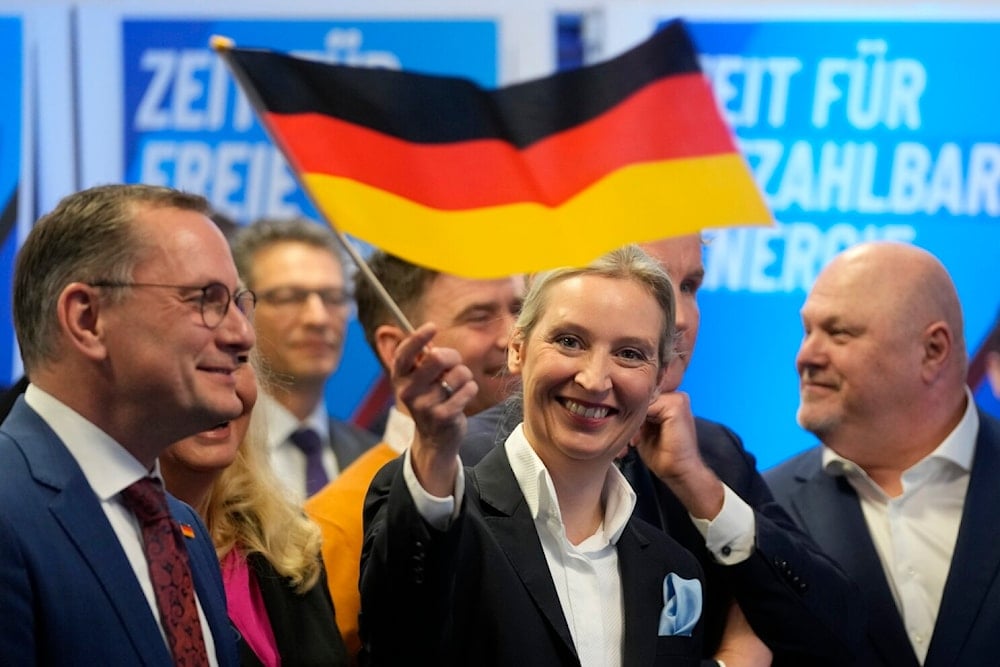Germany classifies AfD party as right-wing extremist group
Germany's BfV intelligence agency designates the AfD a right-wing extremist party, expanding surveillance powers amid rising anti-immigrant rhetoric.
-

Leader of far right AfD Alice Weidel waves a German flag at the AfD party headquarters in Berlin, Germany, February 23, 2025, after the German national election (AP/Michael Probst)
Germany’s domestic intelligence agency, the BfV, announced Friday that it has classified the far-right Alternative for Germany (AfD) party as a right-wing extremist organization. This designation, long anticipated after years of scrutiny, gives authorities broader legal tools to monitor the party’s activities, including surveillance, wiretapping, and the use of informants.
The BfV stated that the move was justified by “numerous instances” of the AfD attempting to undermine Germany’s constitutional democratic order. Officials noted that the party systematically promotes exclusionary rhetoric targeting minorities, particularly those with Muslim backgrounds. "The party aims to exclude certain population groups from equal participation in society," read a statement from the agency.
According to the BfV, AfD leaders have consistently made xenophobic and Islamophobic remarks, framing German citizens with migrant backgrounds, especially from Muslim-majority nations, as outsiders. These patterns of speech and policy have raised significant concerns over democratic cohesion and social stability.
This marks the first time the entire party, not just regional branches, has been placed under such a classification. Several local AfD chapters had already been labeled extremist, but Friday’s announcement formalizes the agency’s stance on the national level and significantly escalates institutional scrutiny.
AfD gains popularity despite extremist label
The intelligence classification comes just months after the AfD finished second in Germany’s general elections, securing more than 20% of the vote. The far-right party has seen a sharp rise in support amid increasing public concern over migration, economic stagnation, and dissatisfaction with the political establishment.
Despite its radical positions, the AfD’s growing voter base reflects broader societal shifts in post-recession Germany. Analysts say the party has effectively tapped into economic anxieties and anti-immigration sentiment, presenting itself as an alternative to traditional parties. It now trails only the center-right Christian Democratic Union (CDU), led by Friedrich Merz, who is expected to form a new coalition government in the coming days.
Earlier this year, former German Chancellor Angela Merkel voiced criticism against Friedrich Merz, over his decision to rely on the backing of the right-wing AfD in a Bundestag vote on stricter migration policies.
At the time, Merkel took issue with Merz's willingness to accept AfD's support, pointing out that in November 2024, he had previously committed to not advancing legislation in the Bundestag with votes from the party.
The classification may test the AfD’s resilience. While it enables the government to ramp up legal oversight, including digital surveillance and covert operations, the party could also frame itself as a victim of political targeting. Similar narratives have bolstered far-right movements elsewhere in Europe.
Critics argue that simply labeling the AfD an extremist group is not enough to address the root causes of its popularity. They emphasize the need for economic reforms, community engagement, and effective integration policies to counter the appeal of nationalist rhetoric.
Origins and rise of the AfD
The Alternative for Germany (AfD) was founded in 2013 as a conservative party opposing the Eurozone bailouts, but it soon evolved into a far-right populist movement. As the European migrant crisis escalated in 2015, the party shifted its focus to anti-immigration, nationalist, and Islamophobic rhetoric, gaining traction among voters dissatisfied with mainstream policies. The ideological shift led to the departure of its moderate founders and paved the way for a harder-right core leadership.
The AfD party has since made significant electoral gains, particularly in eastern Germany, and finished second in the February 2025 general election with more than 20% of the national vote.
According to a February report by the Times of Israel, the party is "deeply divided over support of Israel".
In October of last year, AfD co-chair Tino Chrupalla criticized Chancellor Olaf Scholz for his ongoing support for "Israel" in the form of weapons exports to the occupation state.
“With your delivery of weapons to Israel you accept the dehumanization of all civilian deaths on both sides,” accused Chrupalla. “You are not contributing to de-escalation, but instead you throw oil on the fire,” the Times of Israel reported.
In a controversial, though typical take, Elon Musk posted on X last December, claiming that the group should not be considered far-right.
Obviously NOT “far-right”!
— Elon Musk (@elonmusk) December 20, 2024
Just common sense policies. https://t.co/FNueKCd1Ac
In January, Elon Musk made an appearance at an AfD election event in Halle, Eastern Germany, unexpectedly, offering his public support.
ELON: THERE IS A NEED FOR CHANGE IN EUROPE
— Mario Nawfal (@MarioNawfal) January 25, 2025
"Go out there, talk to people... one vote at a time. There is a need for change, it's got to be done.
This election is so important... the future of civilization could hang on this election.
When something is so important... you… https://t.co/EZaAPwh4SR pic.twitter.com/fdFBUkasTp

 4 Min Read
4 Min Read








